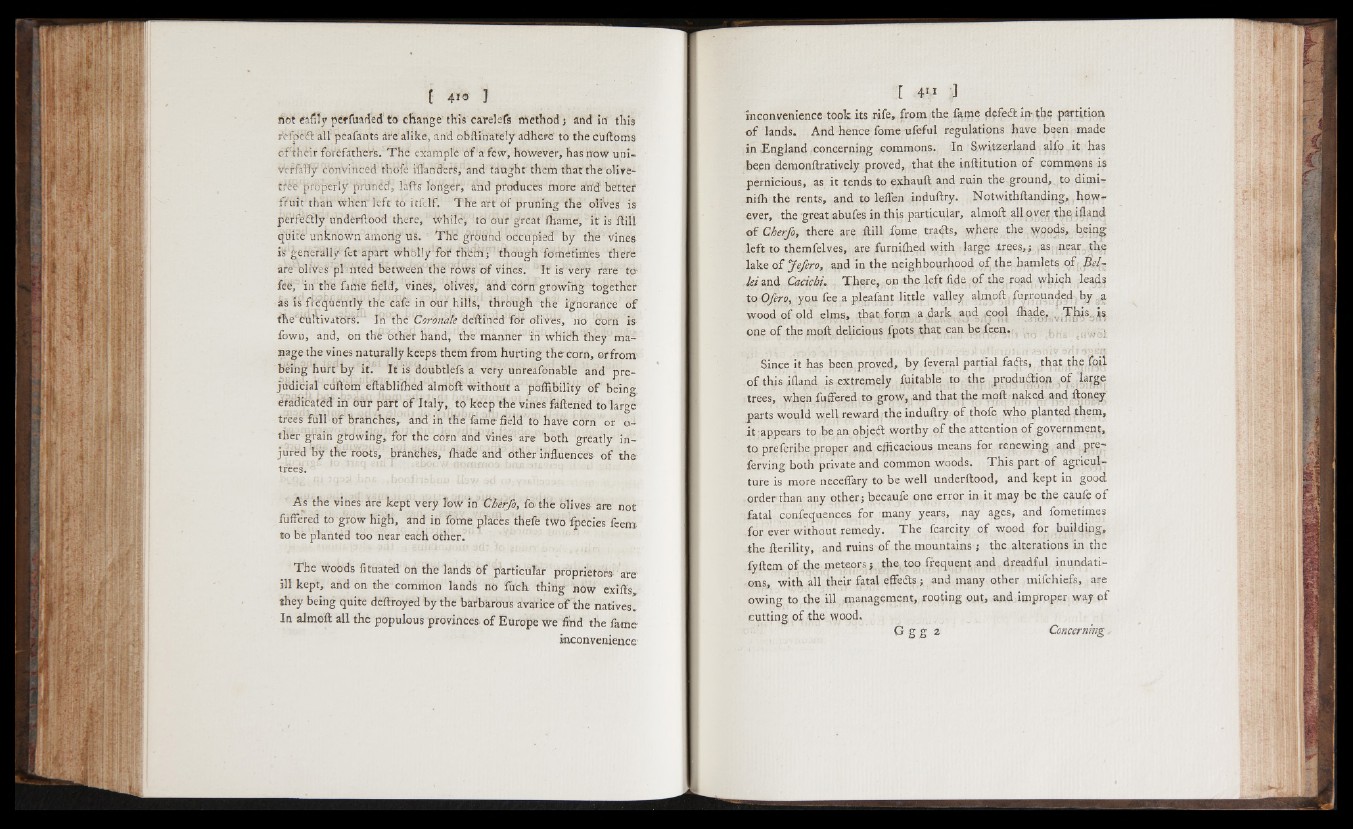
riot eafily perfuaded to change this carelefs method ; and iri this
r'oipeft all peafents are alike, and obftinately adhere to the cuftoms
of their forefathers. The example of a few, however, has now uni-
Vei'felly' ébnviriced thofe Wanders, and taught them that the olive-
tfee properly pruned, lafts lortger, and produces more and better
fruit than when left to itfdf. The aft of pruning the olfves is
pëVfedtJy ù'nderftood there, While’, to our great fhame, i f is ftill
quire unknown amorig us. Th'e ground occupied by the ' vines
is'generally fet'apart wholly fot thfetti; though fometirries there
ale blives planted betweéri the rows o f vines. It is very rare tp
fed, in the fame field, vines, olives, and corn growing together
is is frequently the cafe in our hills, through the ignorance o f
fheThttivatcifs.“ ïri''thé' CoronàfeâëÎ&nèà for dliVës, no corn is
fown, and, on th’ê^bthef hand, the manner 'hrwhich they mai
nage the vines naturally keeps them from hurting thecorn, of from
being hurt by it. It is doubtlefs a very unreafonable and prejudicial
cdftom eftabliihed almbft without a poffibility o f being,
eradicated iri orir part o f Italy, to keep the viries feftened to large
trees full of branches, and in the feme field to have corn*or a-
tiler ^Vain gldwing, for the corn and vines'afe both greatly injured
by the roots, branches, ftiade and other influences' o f the
trees. '
As the vines àré kept very low in Cherfo, fo the olives are not
luffered to grow high, and in ïbme placés thefe two fpecies feem
to be planted too near each other.
The woods fituated on the lands o f particular proprietors are
ill kept, and on the common lands no fu'ch thing now exiffs
they being quite deftroyed by the barbarous avarice o f the natives.
In almoft all the populous provinces, o f Europe we find the fameinconvenience
inconvenience took its rife, from the fa.me defe& in the partition
o f lands. And hence feme ufeful regulations have been made
in England ¡concerning commons. In Switzerland alfo it has
been demonftratively proved, that the inftitution o f commons is
pernicious, as it tends to exhauil and ruin the ground, to dimi-
niih the rents, and to lellen induftry. Notwithftanding, however,
the great abufes in thjs particular, almoft all over the, ifland
o f Cherfo, there are ftill feme tra&s, where , the yyppds, he jpg
left to themfelves, are furniihed with large trees,; ,as .pear , thp
lake o f Jefero, and in the neighbourhood ofj the hamlets o f Belles
and Cacichi. There, on the left fide , o f the road whfeh lead?
to Ofero, you fee a pleafent little valley almoft,.furropnded ,by a
wood of old elms» that.form, ;a^ark( apd.^ooj feadef viyjhis,, js
one of the moft delicious fpots that can be feen. . ,
Since it has been prayed, by feveral partial fails, that the foil
o f this ifland is extremely fmtable' to the produ^ion o f .large
trees, when fuifered to grow, and that the moft naked and ftoney
parts would well reward the induftry o f thoie who planted ¡them,
it appears to bean objeft worthy o f the attention o f government,
to preferibe proper and efficacious means for renewing and pre-
ferving both private and common woods. This part o f agriculture
is more neceffary to be well underftood, and kept in good
order than any other; becaufe one error in it may be the caule o f
fatal confequences for many years, nay ages, and fometimes
for ever without remedy. The fcarcity o f wood for building,
the fterility, and ruins o f the mountains ; the alterations in the
fyftem o f the meteors j the too frequent and dreadful inundations,
with all their fatal effe&s; and many other mifchiefs, are
owing to the ill management, rooting out, and improper way o f
cutting of the wood.
G g g 2 Concerning,